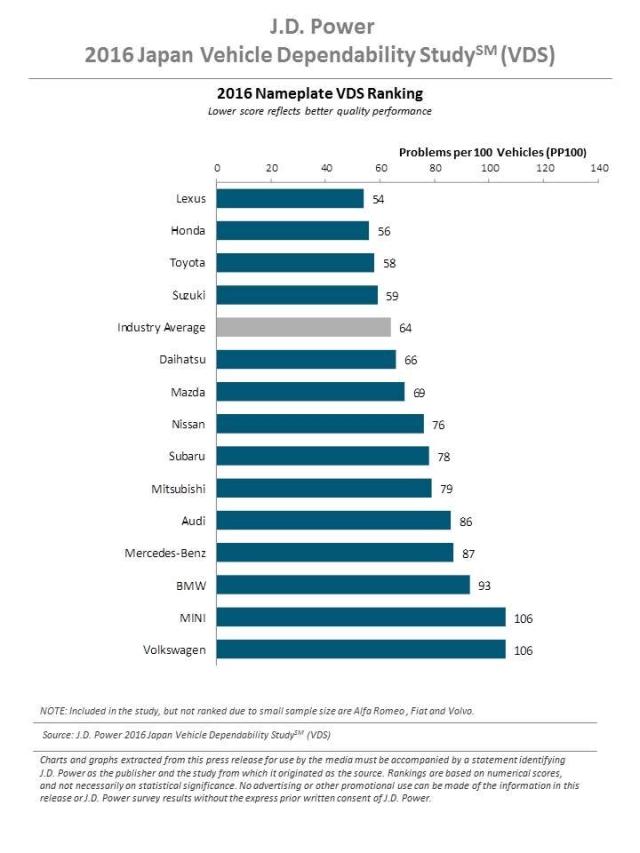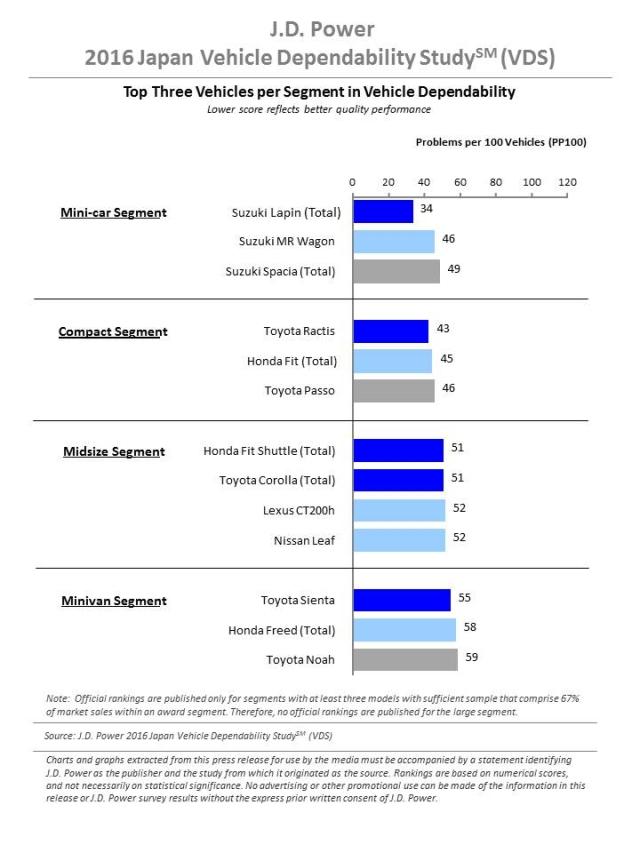Vehicle Dependability in Japan Improves, J.D. Power Study Finds
Lexus Ranks Highest in Industry for Second Consecutive Year in Vehicle Dependability; Toyota Models Receive Three Segment Awards
TOKYO: 20 Oct. 2016 — Vehicle dependability in Japan improves, as owners of 3- to 5-year-old cars report fewer problems with their vehicle than a year ago, according to the J.D. Power 2016 Japan Vehicle Dependability StudySM (VDS), released today.
The study, now in its second year, measures problems experienced during the past 12 months by original owners of vehicles after 37-54 months of ownership. The study examines 177 problem symptoms across eight categories: vehicle exterior; driving experience; features/ controls/ displays (FCD); audio/ communication/ entertainment/ navigation (ACEN); heating, ventilation and air conditioning (HVAC); seats; vehicle interior; and engine/ transmission. Overall dependability is determined by the number of problems reported per 100 vehicles (PP100), with a lower score reflecting higher quality.
Owners report an average of 64 PP100 in 2016, down from 72 PP100 in 2015. Dependability improves across all categories. While the vehicle exterior (13.2 PP100) and vehicle interior (10.9 PP100) categories have the greatest year-over-year decline in problems, these two remain the most problematic areas. The third-most frequently reported problems are in engine/ transmission (10.1 PP100). Together, these three categories account for 53% of all problems reported in the study.
The most frequently reported problem symptoms are unpleasant odors from the air vents, noisy brakes and windows fogging up.
“It is encouraging to see owners report fewer problems overall, as automakers continue to focus on improving the overall quality and dependability of their vehicles,” said Atsushi Kawahashi, senior director of the Japan automotive practice at J.D. Power.
However, dependability is not improving in all areas of the vehicle. Owners are reporting more problems related to the engine idling, excessive fan/ blower noise and Bluetooth pairing/ connectivity in 2016, compared with 2015. The study finds that more vehicles are equipped with the engine idle stop feature (+19%) and the Bluetooth feature (+4%) this year, compared with 2015.
“The increase in technology-related problems is likely due to the increase in the penetration of these features,” said Kawahashi. “Still, it is critical that automakers identify and correct these types of problems now to improve quality, increase customer satisfaction and build consumer trust in the technologies, which will continue to increase in vehicles in Japan. We are already seeing a dramatic increase in the number of vehicles equipped with engine idling and Bluetooth technologies.”
The study finds that vehicle dependability affects customer loyalty and advocacy. Among owners who do not experience any problems with their vehicle, 71% say they “definitely would” or “probably would” repurchase the same brand and 73% say they “definitely would” or “probably would” recommend the model to family and friends. Among owners who experience three or more problems with their vehicle, only 56% intend to repurchase the brand and 61% expect to recommend their model to others.
Highest-Ranked Nameplates and Models
Lexus ranks highest among all nameplates for a second consecutive year, with a score of 54 PP100. Lexus is followed by Honda (56 PP100), Toyota (58 PP100) and Suzuki (59 PP100).
Toyota has three models that rank highest in their respective segments: Corolla, Ractis and Sienta. The Honda Fit Shuttle ranks highest in its segment, as does the Suzuki Lapin.
Following are other key findings of the study:
- Dependability Improves across All Segments: Vehicle dependability improves across all segments. The minivan segment shows the greatest decrease in problems, improving by 13 PP100 to 70 PP100 year over year.
- Small Cars Equal Fewer Problems: The compact segment averages the fewest problems at 60 PP100, which is a 9 PP100 improvement from 2015. The large segment has the highest number of problems at 72 PP100, which is a 5 PP100 improvement.
The 2016 Japan Vehicle Dependability Study is based on responses from 18,777 purchasers of new vehicles in the first 37 to 54 months of ownership. The study, which includes 17 automotive brands and 120 models, ranks models with a sample size of 100 or more usable questionnaire returns. The study was fielded in July 2016.
Media Relations Contacts
Shizue Hidaka; J.D. Power; Tokyo; 81-3-4550-8060; shizue.hidaka@jdpower.co.jp
John Tews; J.D. Power; Troy, Michigan, USA; 001-248-680-6218; john.tews@jdpa.com
About J.D. Power in the Asia Pacific Region
J.D. Power has offices in Tokyo, Singapore, Beijing, Shanghai, Malaysia and Bangkok that conduct customer satisfaction research and provide consulting services in the automotive, information technology and finance industries in the Asia Pacific region. Together, the six offices bring the language of customer satisfaction to consumers and businesses in Australia, China, India, Indonesia, Japan, Malaysia, Philippines, Taiwan, Thailand and Vietnam. Information regarding J.D. Power and its products can be accessed through the internet at japan.jdpower.com.
About J.D. Power and Advertising/Promotional Rules www.jdpower.com/about-us/press-release-info

